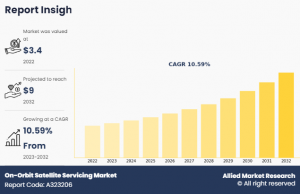On-Orbit Satellite Servicing Market Anticipated to Attain $9.0 billion By 2032, at 10.59% CAGR
The LEO (low earth orbit) segment is the highest revenue contributor to the market during the forecast period of 2022-2032.
WILMINGTON, DE, UNITED STATES, December 16, 2024 /EINPresswire.com/ -- According to a new report published by Allied Market Research, titled, “On-Orbit Satellite Servicing Market," The market size of on-orbit satellite servicing was valued at $3.4 billion in 2022, and is estimated to reach $9.0 billion by 2032, growing at a CAGR of 10.59% from 2023 to 2032.Request The Sample PDF Of This Report: https://www.alliedmarketresearch.com/request-sample/A323206
The capacity and technology to carry out maintenance, repair, refuelling, upgrading, or relocating operations on satellites while they are already in orbit is known as on-orbit satellite servicing. This involves deploying specialised spacecraft or robotic systems to interact and meet with satellites in orbit in order to carry out a variety of tasks meant to improve the satellites capabilities, increase their operational lives, or fix abnormalities and malfunctions.
The growing number of satellites being deployed into space, driven by the growing demand for satellite-based services such as communication, earth observation, and navigation, creates a larger market for servicing these assets. As satellite constellations continue to expand, operators seek cost-effective solutions to maintain and extend the operational lifespan of their fleets, driving the need for on-orbit servicing.
Furthermore, the increasing awareness of space debris and the need for sustainable space operations are driving factors for on-orbit servicing. With the growing population of defunct satellites and debris in Earth's orbit posing collision risks to active satellites, on-orbit servicing can play a crucial role in mitigating this threat by deorbiting defunct satellites, removing debris, or conducting collision avoidance manoeuvres.
The rising complexity and sophistication of satellite technology contribute to the demand for servicing capabilities. Modern satellites are equipped with advanced systems and components, making them more susceptible to malfunctions or degradation over time. On-orbit servicing offers a means to address these issues by providing maintenance, repair, and upgrade services to ensure optimal performance and reliability. The growth in complexity in technology may hamper the market growth during the forecast period.
Furthermore, the possibilities of on-orbit servicing are being increased by the development of sophisticated robotics and autonomous technology. Machine learning and artificial intelligence algorithms combined with robotic systems allow for accurate and effective operations in the hostile environment of space, making complicated service tasks such as payload upgrades, component repair, and refuelling easier.
LIMITED-TIME OFFER - Buy Now & Get Exclusive Discount on this Report @ https://www.alliedmarketresearch.com/checkout-final/aa63c2f12ecf1f173dda659f53c8a3f6
The market for on-orbit satellite servicing is also expanding because of legislative measures and financial incentives designed to encourage space operations that are sustainable and to lessen space garbage. To promote responsible space activities, governments and international organisations are putting rules and guidelines into place. These may include providing incentives for operators to use on-orbit service for satellite maintenance and disposal.
The key drivers fuelling the growth of the on-orbit satellite servicing market are the rising demand for satellite-based services, improvements in satellite technology, worries about space debris, technological advancements, and regulatory measures.
In addition, the European Space Agency (ESA) plays a vital role in advancing the market through its funding and collaborative efforts on ambitious space projects. Countries such as China, India, and Japan have become significant players in on-orbit satellite servicing endeavors within the APAC region. The strong economic expansion in these nations, coupled with their growing reliance on satellite-based applications across industrial and civilian sectors, has led to notable growth in the on-orbit satellite servicing market within the Asia-Pacific region.
The on-orbit satellite servicing market is segmented into type, orbit type, end-user, and region. On the basis of type, the market is bifurcated into active debris removal (ADR) and orbit adjustment, robotic servicing, refueling, and assembly. On the basis of orbit type, the market is divided into LEO (low earth orbit), MEO (medium earth orbit), and GEO (geostationary earth orbit). As per end-user, the market is classified into commercial, government and military.
Region wise, the on-orbit satellite servicing market trends are analyzed across North America (U.S., Canada, and Mexico), Europe (UK, Germany, France, Russia, Italy, Spain and rest of Europe), Asia-Pacific (China, India, Japan, Australia, South Korea, and rest of Asia-Pacific), Latin America (Brazil, Argentina and Rest of Latin America) and Middle East and Africa (Saudi Arabia, UAE, South Africa, Rest of Middle East and Africa).
Inquiry Before Buying @ https://www.alliedmarketresearch.com/purchase-enquiry/A323206
Key Findings of the Study
The robotic servicing segment was the highest revenue contributor to the market, with $1.76 billion in 2022, and is estimated to reach $4.54 billion by 2032, with a CAGR of 10.29%.
The LEO (low earth orbit) segment was the highest revenue contributor to the market during the forecast period of 2022-2032.
North America was the highest revenue contributor, accounting for $1.26 billion in 2022, and is estimated to reach $3.08 billion by 2032, with a CAGR of 9.72%.
Market Key Players
The key players profiled in the on-orbit satellite servicing market report include Maxar Technologies; Astroscales Holdings Inc.; Thales Alenia Space; Airbus SE; Altius Space Machines; Tethers Unlimited; Orbit Fab, Inc.; Momentus Space; Nanoracks (Voyager Space); and Space Logistics LLC. The key strategies adopted by the major players of the global market include product launch and mergers & acquisitions.
Related Reports:
Air Traffic Control Market
Electric Aircraft Market
Aerospace Adhesives Market https://www.alliedmarketresearch.com/aerospace-adhesives-market
Aircraft Electrical System Market https://www.alliedmarketresearch.com/aircraft-electrical-system-market-A06200
Aircraft Sensors Market https://www.alliedmarketresearch.com/aircraft-sensors-market-A06225
David Correa
Allied Market Research
+1 800-792-5285
email us here
Visit us on social media:
Facebook
X
Legal Disclaimer:
EIN Presswire provides this news content "as is" without warranty of any kind. We do not accept any responsibility or liability for the accuracy, content, images, videos, licenses, completeness, legality, or reliability of the information contained in this article. If you have any complaints or copyright issues related to this article, kindly contact the author above.

